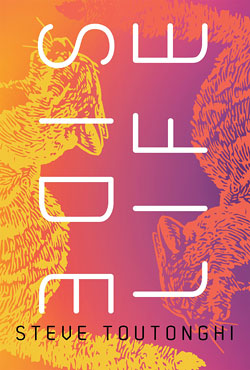Literary Event of the Week: Side Life reading at Third Place Books
Recently, I've been thinking about the formula for the only two plots in existence: someone comes to town, someone leaves town. Cory Doctorow has made hay of these two story structures, of course — it's the title of one of his books — but that framework also applies to a hell of a lot more than just fiction.
Take, for instance, the internet. When I first came online — I was a late bloomer, this was 2000 or so — you had to go hunt for stuff online. You were a stranger, wandering the internet, going from site to site. Now, of course, the strangers on the internet come to us in our little enclaves: Facebook, Twitter.
Two recent science fiction books have been swallowing my brain and jockeying for attention recently: Bandwidth by Eliot Peper and Side Life by Seattle author Steve Toutonghi. And I think part of the reason I've been thinking so much about these books is that they address this duality of storytelling. In one novel, everything comes to you. In the other, you reach out to everything else.
Here's Bandwidth's description of the feed, a central conceit of the book:
The feed was your personal lens through which to gaze into the digital abyss, the algorithmic curator that delivered what you needed when you needed it from the surfeit. It was the permeable membrane through which you experienced and participated in culture, the arbiter of what you found when you searched and what you discovered when you dipped into the rolling, throbbing cosmos of global conversation. Any individual voice or channel or vector was necessarily partisan. But the feed itself...The feed was infrastructure. Plumbing didn't know or care about a resident's sexual preferences any more than sidewalks pondered the daydreams of pedestrians. The feed was neutral. It was inviolable. It was sacred.

If this model — the future delivered to you via feed — is sacred, Side Life's technology is decidedly profane. Vin, a tech entrepreneur on the skids, accidentally discovers a new technology that moves him out into the universe in new and unexpected ways.
Vin has no memory between blacking out in the crèche and finding himself here. This must be a lucid dream. It pulls at his awareness, requiring attention the way that driving tired does. He's confused and trying to remember who he is. He says to himself, "My name is Vin Walsh." His dream responds with mysterious certainty: "I am Winston Churchill.
When Vin enters these podlike crèches, he finds himself in someone else's body in another time and another place. At first it feels like virtual reality, a game of some sort. But then he discovers he can alter reality in the worlds he's accessing. He's not passive. He's active.
I'm inclined to want to be the someone leaving town, the person walking out into the world, and maybe for that reason the story of Side Life appeals to me more than the one in Bandwidth. But this seems to be the duality we're facing as we move into the future. Are we going to be passive citizens, receiving the information that some algorithm has picked out for us? Or are we going to move about in the universe (or universes,) breaking things and figuring out our role?
Steve Toutonghi reads this Thursday at Third Place Books Lake Forest Park, 17171 Bothell Way NE, 366-3333, http://thirdplacebooks.com, 7 pm, free.